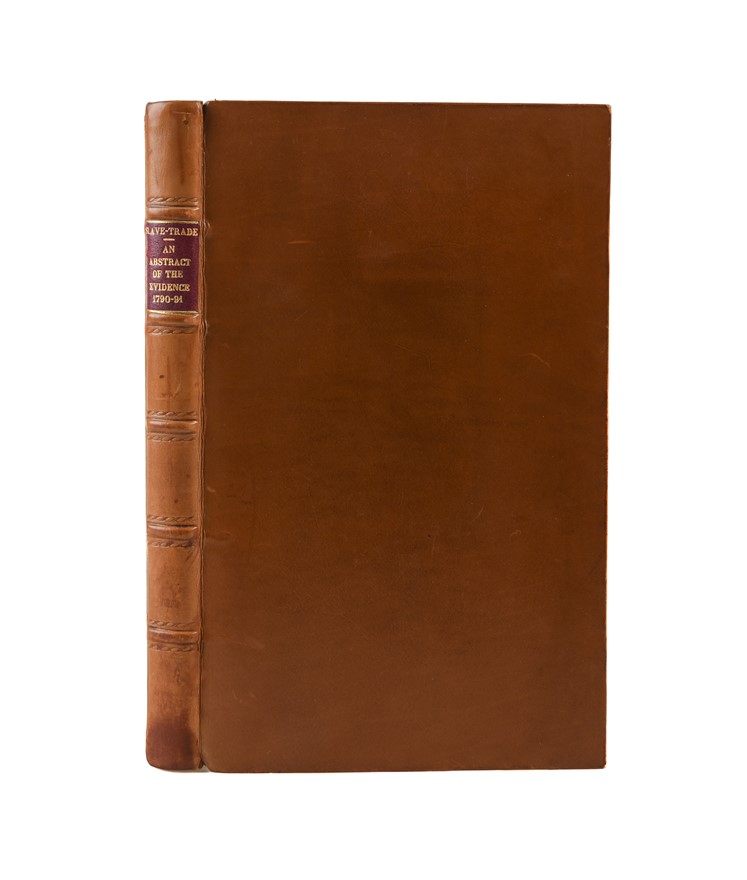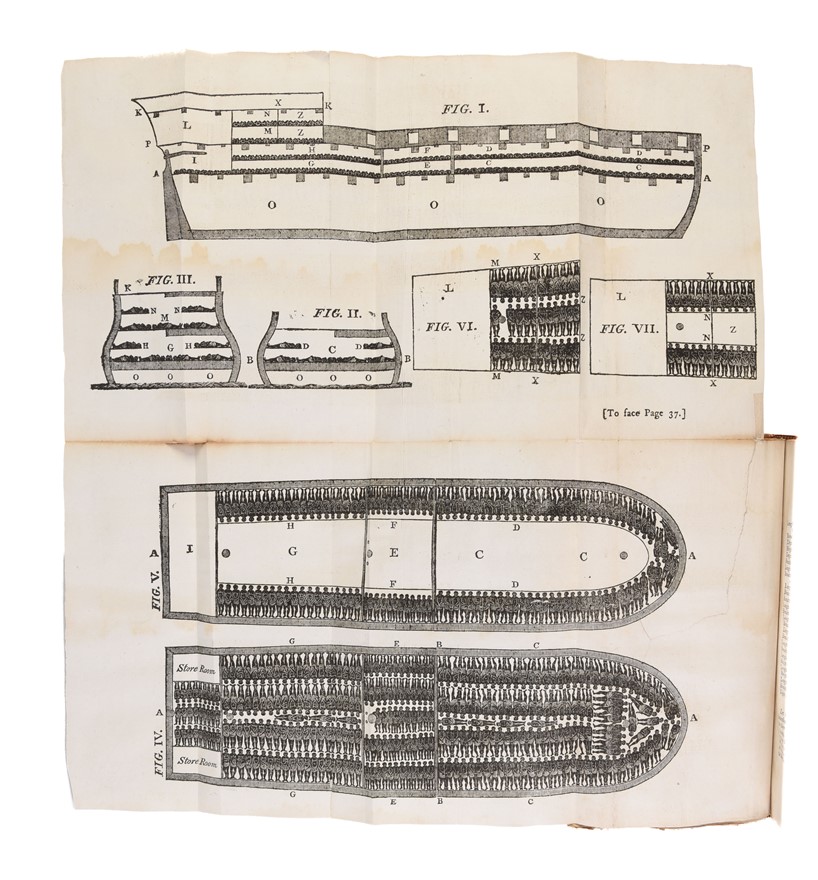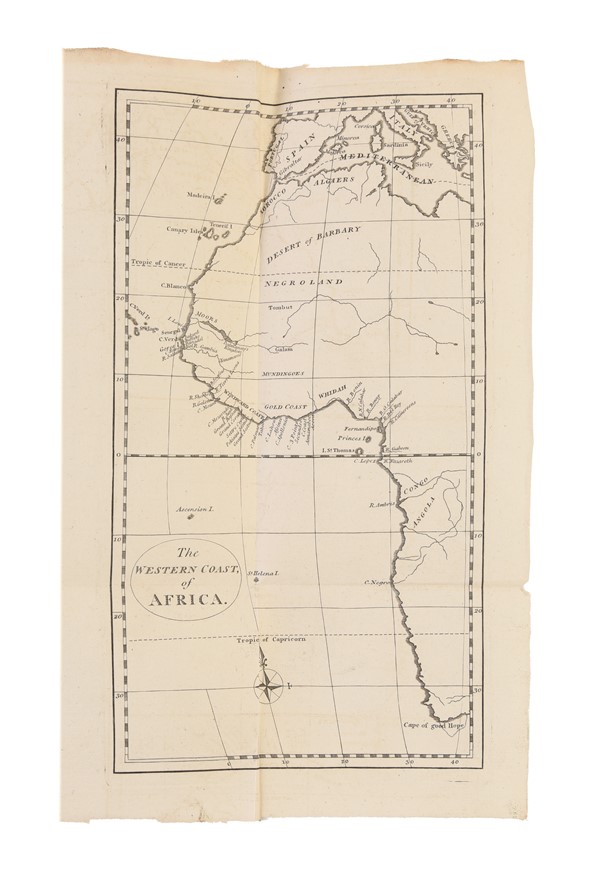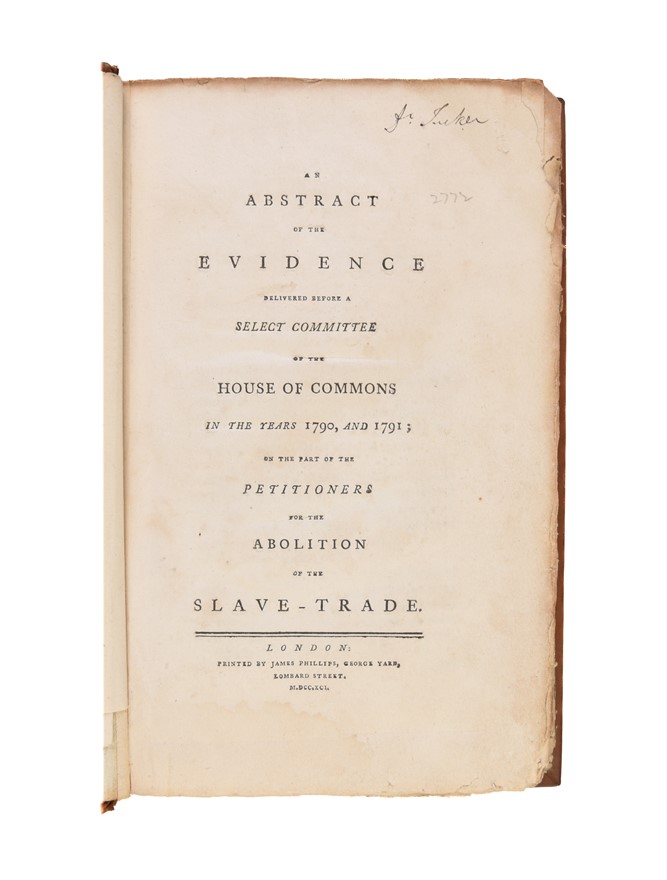An Abstract of the Evidence delivered before a Select Committee.
WILBERFORCE William. (1791.)
£4250.00 [First Edition]
Please contact us in advance if you would like to view this book at our Curzon Street shop.
A VITAL CONTRIBUTION TOWARD THE ABOLITION PROCESS
of the House of Commons, in the Years 1790, and 1791; on the Part of the Petitioners for the Abolition of the Slave-Trade.
First edition. Folding plan of a slave ship & folding map. 8vo. Twentieth-century full calf, red morocco label to spine. xxvi, 156pp. London, James Phillips,
Important abstract of the evidence presented to the select committee of the House of Commons with testimony by many of the leading champions of the abolitionist cause. The work also includes an engraving of three horizontal and four vertical views of the slave-holding decks of the slave ship Brookes with a cargo of 482 closely packed bodies.
"The parliamentary hearings, which had dragged on intermittently for nearly two years, ended in early 1791. The abolitionists then faced a curious problem. There were nearly 1,700 pages of House of Commons testimony, on top of the hefty 850 page volume from the Privy Council hearings of several years earlier, filled with eyewitness accounts, tables, and excerpts from slave laws of different colonies, some of them in French. No one could expect even the most sympathetic M.P. to master this mountain of material. And so, in the weeks before the next debate on the slave trade began, a group of abolitionists embarked on a feverish collective editing marathon - Wilberforce even working on Sundays, so urgent did he feel the task - to distill some three years of testimony into an account short enough to be given to each M.P. to read. The committee then sent it to all of them" (Hochschild)
The preface to the Abstract states the purpose of this work and outlines the historical context for it: "In consequence of the numerous petitions which were sent to parliament from different Counties, Cities, and Towns in Great Britain, in the year 1788, for the ABOLITION of the SLAVE-TRADE, it was determined by the House of Commons to hear Evidence upon that subject. The Slave-Merchants and Planters accordingly brought forward several persons as witnesses, the first on behalf of the continuance of Slave-trade, the latter in defence of the Colonial Slavery. These were heard and examined in the years 1789 and 1790. Several persons were afterwards called on the side of the petitioners of Great Britain, to substantiate the foundation of their several petitions, and to invalidate several points on the evidence which the others had offered. These were examined in the years 1790, and 1791. This abstract then is made up from the evidence of the latter, in which little other alteration has been made than that of bringing things on the same point into one chapter, which before lay scattered in different parts of the evidence; and this has been done to enable the reader to see every branch of the subject in a clear and distinct shape."
Following the preface is an interesting alphabetical list (with biographical sketches) of the witnesses. The anonymous compiler of this abstract has also indicated where the testimony of each witness appears in the voluminous original printing by the House of Commons and by so doing, has provided a valuable reference tool.
One of the more important aspects of the Abstract is that it offers, apparently for the first time in print, a developed argument against the claim by the proponents of the slave trade that "with this traffick are ... deeply blended the interests of this country, and those of numerous individuals." Of all the arguments that the slavery interest offered, economics was the hardest to combat - it would be impossible to convince parliament that national commerce would not suffer with the abolition of the slave trade. The situation required the development of a new line of thinking and the abolitionists framed in chapters six and seven (pp. 94-99) of the Abstract their new concept of 'legitimate trade'. The abolitionists argued that Africa produced plenty of other goods "in which they could offer [in] a trade to the Europeans in the place of the trade in slaves' (94) and that these goods would more than make up for any aggregate loss occasioned by abolition. This concept of 'legitimate' or 'socially responsible' trade became a cornerstone of British African policy in the nineteenth century, an article of faith espoused well after 1850 by such figures as Livingstone and Kirk" (Austin).
Austin, R.A. & Woodruff D. Smith, W.D., "Images of African and British Slave-Trade Abolition: The Transition to an Imperialist Ideology, 1787-1807" in African Historical Studies, Vol. 2, No. 1 (1969), pp.69-83; Hochschild, Adam. Bury the chains (New York, 2005) p.89.
Stock Code: 252238







